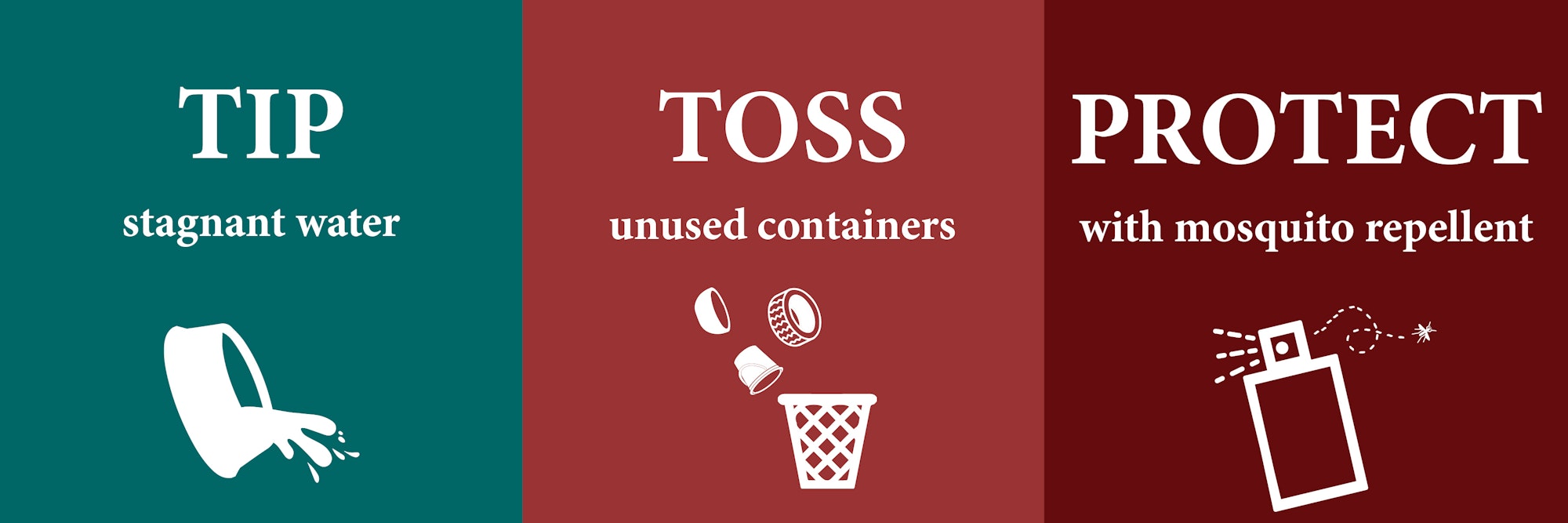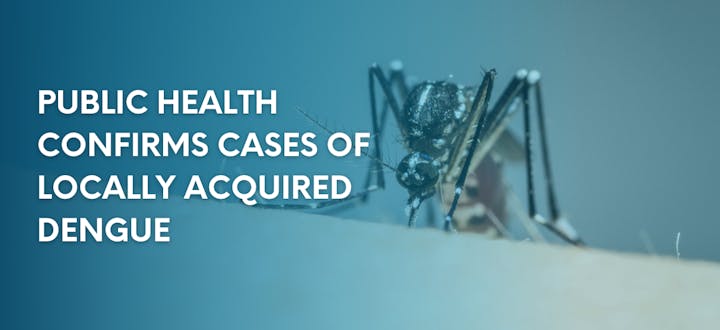Dengue in the San Gabriel Valley

Updated: 11/12/2025
Dengue is primarily transmitted through the bite of an infected Aedes mosquito. Invasive Aedes mosquitoes are common in the San Gabriel Valley, but cases of locally acquired dengue are rare. Over the past couple of years, travel-related dengue cases have increased due to ongoing outbreaks around the world. The Centers for Disease Control and Prevention (CDC) continues to issue health alerts regarding the increased risk of dengue virus (DENV) infections in the United States
Dengue in the San Gabriel Valley
Number of locally acquired Dengue cases in San Gabriel Valley (2025): 5
October 15, 2025: Public Health Investigating First Case of Locally Acquired Dengue for the 2025 Mosquito Season (Link to Public Health Update)
2024 Summary
In 2024, a total of 11 locally acquired dengue cases were reported in the San Gabriel Valley:
- 8 in Baldwin Park
- 2 in El Monte
- 1 in Pasadena
These cases were reported by the Los Angeles County Department of Public Health. For more information regarding human cases, please contant the Los Angeles County Department of Public Health.
2024 Public Health Updates:
October 30, 2024: Public Health Confirms Two Additional Cases of Locally Acquired Dengue - Healthcare providers urged to be vigilant for dengue (Link to Public Health Update)
October 15, 2024: More Cases Identified in Baldwin Park (Link to Public Health Update)
October 2, 2024: El Monte Dengue Case (Link to Public Health Update)
September 18, 2024: Baldwin Park Dengue Cluster (Link to Public Health Update)
September 9, 2024: First Dengue Case of 2024 in Baldwin Park (Link to Public Health Update)
2023 Summary
Cases of locally acquired dengue were previously confirmed by Long Beach and Pasadena in fall of 2023.
District Response
SGV Mosquito works collaboratively with public health agencies to increase surveillance, mosquito testing, mosquito control efforts, and public education to reduce the risk of additional dengue transmission and mosquito populations.
In response to local disease activity, District staff expand surveillance by deploying additional traps and increase the frequency of testing to identify the presence of mosquito-transmitted diseases in local mosquito populations. Field staff conduct door-to-door property inspections and mosquito treatments to reduce adult mosquito populations and breeding sources. Overnight truck-mounted treatment events may be planned in the affected communities, if necessary. Residents may visit www.publichealthmosquito.org to find out more information regarding scheduled treatments.
If residents suspect they are experiencing any dengue-related symptoms, they are encouraged to reach out to their primary health care provider.
Frequently Asked Questions
Dengue is a viral disease caused by any of the four related viruses: dengue virus 1, 2, 3, and 4. Dengue viruses are spread to people through the bite of an infected Aedes mosquito. A person can be infected with dengue multiple times in their life. The most common dengue symptom is fever with:
- Aches and pains (eye pain, typically behind the eyes, muscle, joint, or bone pain)
- Nausea, vomiting
- Rash
If you feel you are experiencing dengue-related symptoms, please contant your primary care doctor.
No. Dengue can only be transmitted through the bite of an infected mosquito. A person infected with Dengue during pregnancy can pass the virus to their fetus. Dengue is not passed from female mosquito to mosquito offspring.
Visit the CDC website to learn more about how dengue spreads: LEARN MORE
The best way to prevent acquiring dengue is to eliminate mosquito sources on your property and use insect repellent that works. Insect repellent should have one of the four active ingredients recommended by the CDC, which include: Picaridin, DEET, Oil of Lemon Eucalyptus, and IR3535.
If you are traveling to a country with an ongoing dengue outbreak, it is extremely important to use insect repellent while you are there and when you return from your travels to prevent spreading any disease locally.
Visit the CDC website to see what areas around the world are experiencing dengue outbreaks: LEARN MORE
Aedes mosquitoes (ankle biters) are capable of transmitting dengue, Zika, chikungunya, and yellow fever. Here in the San Gabriel Valley, we have three types of invasive Aedes mosquitoes: Aedes aegypti, Aedes albopictus, and Aedes notoscriptus.
Aedes mosquitoes are agressive, black-and-white insects that thrive in our cities. Aedes are also called "ankle biters" due to their behavior of biting people near the feet.
Learn more about Aedes mosquitoes and how they're different from our native mosquitoes: LEARN MORE

There may be two reasons why you keep seeing mosquitoes in your yard or patio: sources and resting sites.
Mosquitoes only need a SPOONFUL OF WATER and five to seven days of perfect weather to go from mosquito egg to flying adult. We urge residents to practice these simple steps to create a bite-free home: TIP, TOSS, and PROTECT:
- TIP out standing water at least every five days.
- TOSS out any unused containers that may collect water.
- PROTECT yourself using loose-fitted clothing and wearing insect repellent that has one of the CDC-recommend active ingredients: Picaridin, DEET, IR3535, Oil of Lemon Eucalyptus.
Check out mosquito prevention and protection resources for more information: LEARN MORE







